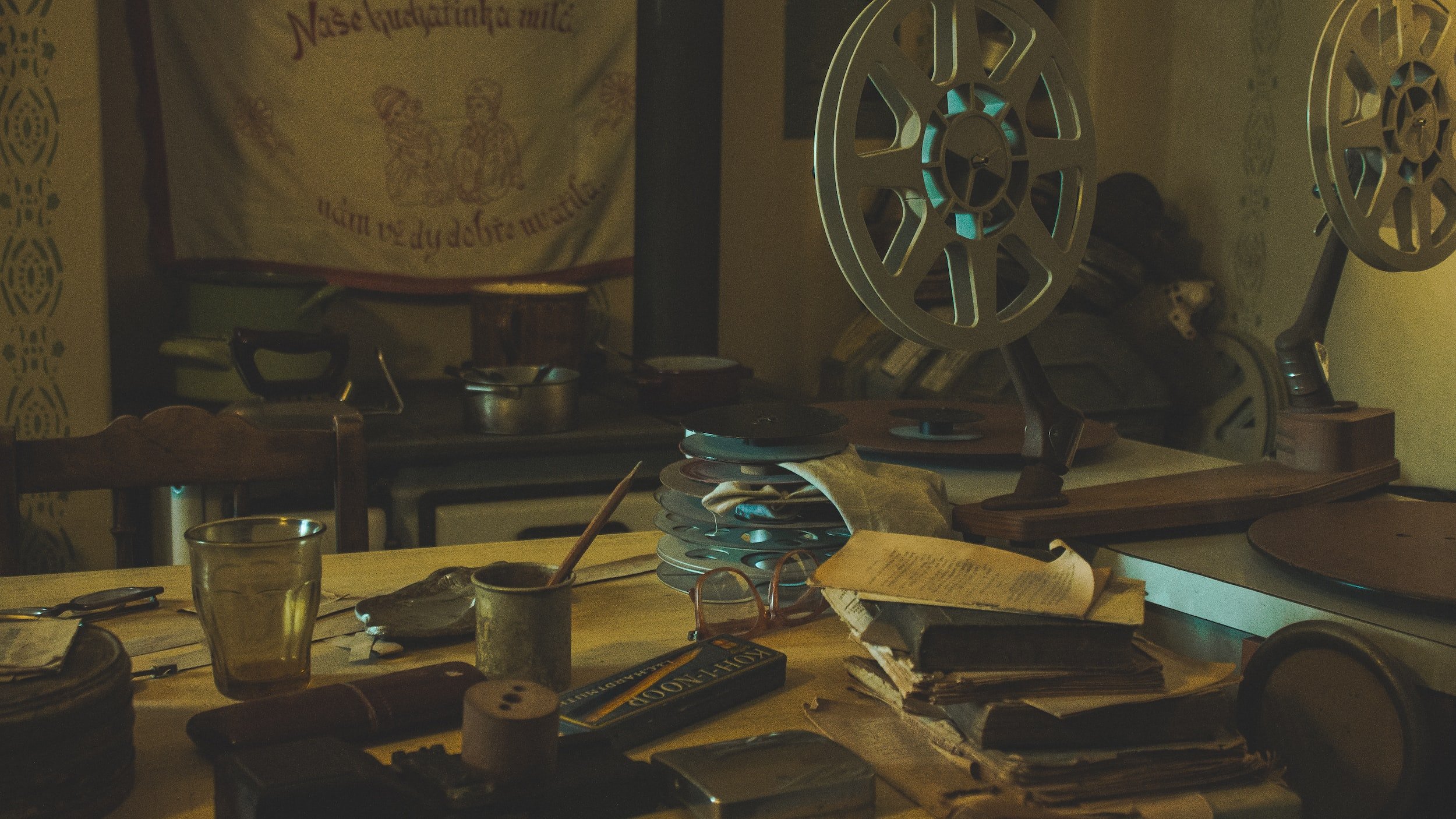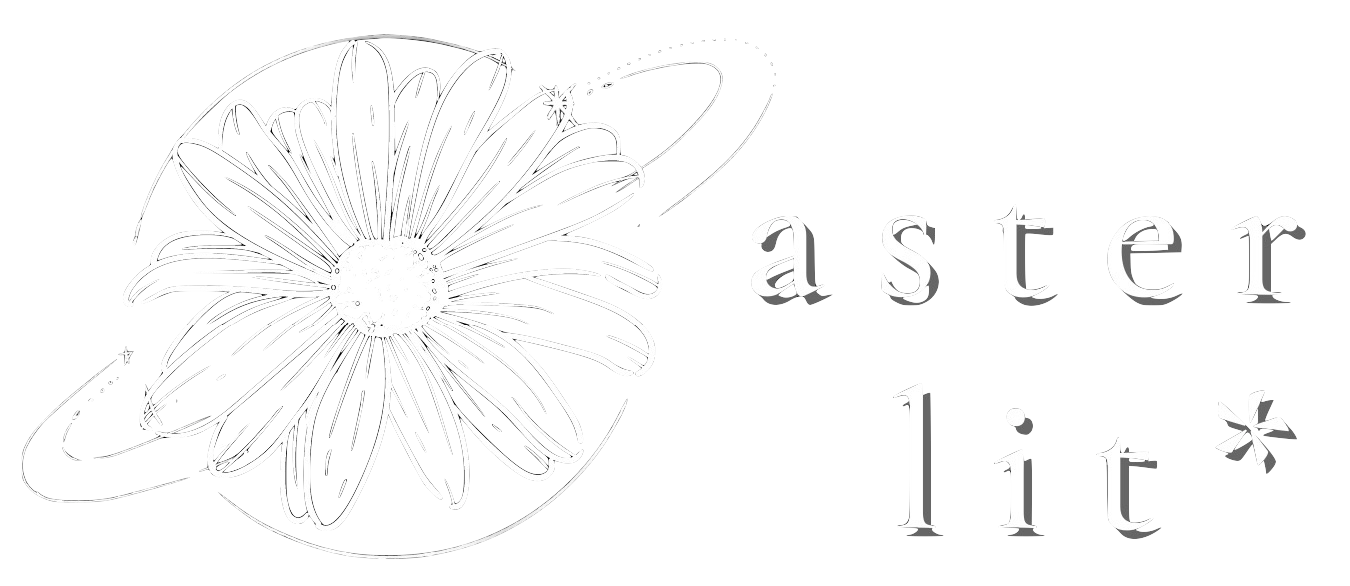
Aster Lit: Remembrance
Issue 7—Fall 2022
cloud factories
Joshua Peter, United States
child of the stars, do you remember those nights? in the naïveté of youth, the world and all her pearls appeared new to us. we ran till our bodies glistened, our noses red and our lips cracked with elation and cold, the yielding winter sun decanted what golden tea, what liquid light it could gift our wide eyes. we were always the dreamers, eyes perpetually inclined towards those skies, tiptoeing on the creases of our wide-brimmed smiles. i will remember you by the honeysuckle lacing your lips, the sticky blaze of fireflies casting pale freckle shadows on your neck. we found nirvana as the clock struck 9:30.
11/4/2008 | 9:30 pm | pottstown, pennsylvania
we left the party at half past nine. my ankles were red and swollen. god knows those skates were never disinfected in between uses; the laces frayed, and the suede was scuffed and worn. i might’ve sprained something. we slipped out of the roller rink, hand-in-hand. idiot, i’m still not sure what you were laughing at but it made me laugh too.
too cold outside.
i peered in through the fogged glass: casey and becca were bathed in a slow, hideous wonder as they slow danced in the center of the room. they looked perfect there: pottstown’s very own dean forester and rory gilmore, at least until jess mariano showed up. they were all fake anyways.
not elise and jacqueline though: they didn’t play the game. they didn’t need to wind up their springs like the rest of us on these sleepy small-town weekends. they chased their highs with heads
emerging from moon roofs, coasting on highways and night air. we were outcastes who embraced our shared wallflower-ship: old souls, bittersweet hearts. their company was missed, but i didn’t mind. it was just us tonight, and that was okay, that was more than okay.
way too cold outside.
you wore black jeans, a threadbare wifebeater tank top, and a wheat-colored corduroy shirt jacket. it was an outfit ill-suited for the night, but we couldn’t afford excess, so we stuck with what we had. everyone lived on borrowed money and borrowed time in those days, paycheck to paycheck. i like the cold, you used to say, remember? you still had that stupid grin perpetually plastered on your face like the lucky cat perched on the shelf in your dad’s tea house, but your excessive sniffling and shivering betrayed you. idiot, but my idiot always. i tucked you into my well-worn shearling jacket, tugging the collar up to your chin. icy dew clung to your eyelashes, pearly bright in the deepening twilight and foggy reflected headlights of passing cars.
it had started to snow, a welcome softness after the week of sleet we had had. headlights glinted off your sleepy eyes and shiny reddened nose as we trudged through the fresh snowfall to my car. my parents weren’t home tonight, and besides, they loved you enough to not need notice when i brought you with me. we were greeted by the whirring of tape and richard edwards’ breathy tenor on “broadripple is burning”. you always preferred jazz, but margot was our middle ground. it was a short enough ride to home. kicking off our shoes, i half-hurled you onto our couch. i turned to the kitchen and fished some cardamom pods out of a jar in the lazy susan where mamma used to keep her tupperware. we didn’t have much left from the last time we brought them from india, so we used them sparingly. it was routine: the minced ginger and the cardamom went in the pot, followed by enough water and milk for the two of us. you had apparently sunk into the couch, taking a woolen blanket with you. three spoons of tea leaves, bring to a boil twice, and a generous
splash of evaporated milk. you rested your chin on the couch back, blanket wrapped around your grinning face like a nun’s habit as i handed you a steaming mug. cardamom and ginger, nothing else. your taste in chai was reflective of you: warm, comforting, robust. and it was you and these shared cups of chai that used to make these long winter nights bearable.
but no longer.
i will never get to sip anything with you again, simien. never again will we play that game where, on your breaks from work at the shop, you’d cover my eyes and hold the metal flip-top tins of tea to my nose, asking me to guess the contents: the pavakka(1)undertones of a keemun black, the malty vegetal sweetness of a mao xie(2) oolong, i’d make a candle of it all and keep it for the rainy days when the scent of rainwater on pavement and topsoil unwittingly brings me to the porch of your house dazed, where your dad sits solemn and tearful.
i will never get to hold your hand at homecoming, alongside elise and jackie, fussing over tie clips and shirt collars. those polaroids are relegated to the forlorn bookshelves of “what could’ve been?”. no more rehearsals with our best friends, no more duets besides the chipped, yellowing ivories of that old steinway upright, no more coy smiles exchanged over analytical trigonometry or fahrenheit-451 or rousseau’s social contract.
i will never get to kiss you again and no amount of shower water sacrilege will change that fact. this profane ritual is the only way i can remember the weight of your lips on mine, the taste of shivering in the all-encompassing warmth of a fourth of july evening, the simple pleasure of downing sickly sweet hazelnut creamer cups in gas stations and diners like poor man’s candy, the reassurance and security of dada tracing the kurishu(3) on my cold, sweat-streaked forehead after a nightmare.
you are where my secrets went to die, sim. now you too, are gone forever. the time i told you about stealing an extra slice of cake, or of accidentally using the girls’ bathroom freshman year, or looking through my teacher’s desk without permission, or quietly pleading my grandparents would be dead by the time i married because i, someone who has never made a definitive decision in his life, like both girls—and boys. i can’t help but feel that it’s my prerogative to come clean about it all.
it’s too much. it’s all too much.
i stayed home for a week after it happened, eating and drinking only to sustain, never to enjoy. the lid on the cardamom jar was screwed on tight for a while. god knows even a whiff of the spice would’ve made me vomit. my fingers trembled when i grasped the handles of teacups. i started drinking coffee instead, the oily but satisfying aftertaste lingering on my breath as i stayed awake grieving into the early hours. it was revolutionary to be cruel to myself: this was adulthood—sharp, angry, and unforgiving—was it not? this was my protest, my misguided progression through the stages of grief. my parents grieved too, you know? you were like a son to them…the superior child, even.
at your funeral, a dreary november sunday morning, you looked to me as you did the night of casey knight’s roller rink party: perfect, at peace, and yet not present in the moment. you honestly would’ve hated it: it was the keep-your-voice-down, thoughtfully-fumble-with-your-handkerchief, larger-than-life eulogy, thoughts-and-prayers-with-the-family type of burlesque we’d annotate in english. i seethed in quiet with fists and jaw clenched. elise in a dress, could you imagine?; jackie choking back tears. we were a tableau of a fury-fueled sort of solidarity unknown to any of the other attendants as we placed the crimson-almost-black roses on the lacquered top of your casket, our final farewell.
you didn’t leave a note, and i’m rather glad you didn’t. closure was a myth of false consolation…i’d rather be left uncertain than with the certainty that it was because of me you took your life in that ancient ‘98 toyota camry, ever-poetic with some albert camus book splayed open in your lap. did i cross your mind before the hazy black exhaust took you? did the certainty of being with your mom in heaven, of soon being able to play the piano besides her once again assuage your pain? or were those final moments darker, a replay of every punch you took for me, every slit-eye, slope-head, chink you took without a single word of retaliation? and is it really lucky that they never found out i loved you in a way that dare not speak its name? your name should not be tarnished in the minds of my parents, i would think. your dad knew of…my sickness, and still he found room in his patchwork quilt heart to love me as he loved you.
i passed your grave on the way to school, when i finally returned january of next year. i didn’t miss too much school because of thanksgiving and christmas break, and my parents didn’t want to rush me. that new subdivision, benwick? they started building it. the developers spared the cemetery, so now it looks like a lush green granite-pockmarked grove among the uniformity of suburbia. i peered in through a fresh-painted white picket fence, the artificial blue of a chlorine swimming pool peering back at me. my fingers were scraped, my knuckles bandaged. i got stares as i walked into algebra, and i calmed my shaking bruised up jaw.
go home faggot, paki, terrorist.
the words were familiar. a sick comfort, almost. the grade school bullies were the one thing i kept, i guess. i’d fight back, as i do, and leave even more bruised. this was the way i knew god to work, and i wouldn’t give him the satisfaction of repentance. i fell asleep behind a self-devised shelter of algebra and calculus textbooks, the normally outspoken ms. palmieri too afraid to try and awake me. i dreamt of your fingers in my hair in my boy-bed, as we stared out snow-dusted windows,
flannel-clad, sleepy-eyed, and slack-jawed. i dreamt that the cloud factories way up high, in their lofty domain, painted a picture of us ill-fated lovers in the sky.
~fin.
(1) pavakka (പാവയ്ക്ക) | bitter gourd, a vegetable commonly used in south/east asian cuisine
(2)mao xie (毛蟹) | hairy crab, a varietal of oolong tea
(3)kurishu (കരു ിശ്) | the sign of the cross
Song that inspired this piece: “Cloud Factories” by Flower Face
High school senior Joshua Peter thinks of himself as a wren: unassuming, nondescript, a wallflower. Inquisitive and almost always singing, he, much like the humble bird, enjoys exploring and observing. He searches for the beauty and humanity in the world and tries to capture it in his poetry, prose, music, and artwork (disproportional and anatomically inaccurate as it may be). His writing is heavily influenced by his "third culture" identity as the son of South Indian immigrants, and his suburban upbringing in Texas (and Philadelphia, Pennsylvania, prior to moving to Houston in 2013).
